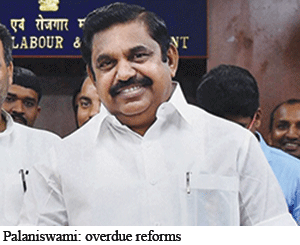 Stung by rising public criticism that students from Tamil Nadu’s schools are at a disadvantage when writing national entrance exams for entry into the country’s premier engineering and medical colleges, the ruling All India Anna Dravida Munnetra Kazhagam (AIADMK) government led by E.K. Palaniswami, who succeeded three-term chief minister J. Jayalalithaa who passed away last December, is planning a major revamp of the state’s school education system.
Stung by rising public criticism that students from Tamil Nadu’s schools are at a disadvantage when writing national entrance exams for entry into the country’s premier engineering and medical colleges, the ruling All India Anna Dravida Munnetra Kazhagam (AIADMK) government led by E.K. Palaniswami, who succeeded three-term chief minister J. Jayalalithaa who passed away last December, is planning a major revamp of the state’s school education system.
On May 23, the AIADMK government issued orders for conduct of a compulsory board examination for class XI students of the state’s 53,000 government and 10,934 private schools affiliated with the Tamil Nadu State Board of School Education (TNSBSE) starting this academic year (2017-18). Hitherto, board exams were mandatory only for students of classes X and XII. The AIADMK government also directed the State Council of Educational Research and Training (SCERT) to overhaul the curriculums of classes I-XII in a phased manner over a period of three years starting from the academic year 2018-2019, to place it on a par with the curriculum of the Central Board of Secondary Education (CBSE).
The AIADMK government’s decision to introduce a compulsory board exam for class XI students comes in the wake of recommendations made by a committee constituted by the Chennai-based Anna University — the state’s premier engineering and technology university with 552 affiliated engineering colleges — which found that several TNSBSE-affiliated schools omit half the class XI syllabus which covers basic concepts in science and math, and begin teaching the class XII curriculum to ensure their students are well-prepared for the school-leaving board exam. As a result, even top class XII scorers admitted into the state’s engineering colleges fail miserably in their first semester math and physics exams, because they lack the basic conceptual skills they should have learned in class XI. According to knowledgeable educationists in Chennai, nearly 50 percent of first year students admitted into the 523 private engineering colleges affiliated with Anna University, failed their first (November-December) and second (April-May) semester exams last year (2015-16).
Although the long-overdue revision of the TNSBSE syllabus/curriculum has been unanimously welcomed by students, parents and teachers, the proposal to introduce a compulsory class XI board exam has evoked mixed response. “Students will be under a lot of pressure as they have to write three consecutive board exams, and teachers will have less time for revision. Moreover, reducing the total marks of 1,200 by half in classes XI and XII will not serve any useful purpose but could result in downsizing content and practicals, a major blunder of the class I-X samacheerkalvi curriculum. Instead, the education ministry should ensure that TNSBSE’s question papers test students’ analytical and knowledge application skills, and that teachers are adequately trained to mentor students,” says R. Visalakshi, president of the Tamil Nadu Matriculation Schools Association.
The warning issued by educationists to the newly inducted Palaniswami-led AIADMK government (sworn-in on February 16) to be cautious about repeating mistakes of the past is timely because the syllabus for classes I-X and the TNSBSE’s higher secondary curriculum and examination systems are completely out of step with the needs of India’s best universities and industry. Despite numerous warnings from knowledgeable educationists (and EducationWorld) that the state board’s higher secondary syllabus (last revised in 2005) encourages rote memorisation at the cost of developing critical thinking and analytical skills required to crack common national entrance exams such as IIT-JEE and the All India Pre Medical Test (AIPMT), the status quo has been maintained.
Only after the Supreme Court mandated the National Eligibility-cum-Entrance Test (NEET) as the sole common entrance exam for admission into all medical and dental colleges countrywide from 2017-18, has the state government woken up to the need to revise and upgrade TNSBSE syllabuses. NEET is based on the CBSE syllabus and tests the critical thinking and analytical skills of students. Ditto IIT-JEE.
Although belatedly, the AIADMK government has taken the first steps towards revamping school syllabuses/curriculums, educationists are urging the state government to ensure that TNSBSE’s assessment and evaluation systems are also overhauled to test the critical, analytical and knowledge application skills of students of its affiliated schools.
This harmony is essential for the school education reforms decreed by the post-Jayalalithaa AIADMK government to succeed.
Hemalatha Raghupathi (Chennai)